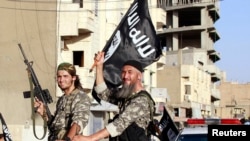Sanctions have emerged as a leading tool of American foreign policy. The goal, said U.S. Deputy Assistant Secretary of State for Counter Threat Finance and Sanctions Peter Harrell, is to “maximize the impact of sanctions while minimizing their costs on innocent civilians and private businesses at home and abroad.”
Recently, the sanctions tool has been wielded against the growing terrorist threat known as ISIL, or the Islamic State of Iraq and the Levant. Unlike al-Qaida, which largely relied on deep-pocketed donors for financing, ISIL derives much of its funding internally from criminal activities. In other words, it raises much of its money through extortion, looting towns and villages, and selling oil in territory under its control.
But ISIL also makes use of external sources of funding through oil smuggling to neighboring countries, kidnapping for ransom, and other sources.
Countering ISIL’s financing is absolutely central to the United States’ objective of destroying ISIL and ensuring that it cannot attack the U.S. or its allies. It is part of a broader strategy that also includes conducting a military campaign in Iraq and Syria, preventing foreign fighters from traveling to the region, de-legitimizing ISIL’s ideology, and providing humanitarian relief to the people of Iraq and Syria.
The United States will be working with states bordering Iraq and Syria to prevent ISIL from smuggling oil outside of territory it inhabits or from bringing cash into those places. The U.S. will be using designation authorities to sanction people and companies doing business with ISIL or giving it money.
Already, an impressive array of countries is joining the effort. The U.S. is working with partners to build an international coalition that shares information and develops joint approaches to combatting ISIL’s financing.
Private companies will have as important a role to play as governments around the world in cutting off funding to ISIL. The private sector needs to help identify and cut off potential avenues for ISIL’s illicit financial flows.
Sanctions have a clear and critical role to play in the effort to defeat terrorist threats like ISIL.






